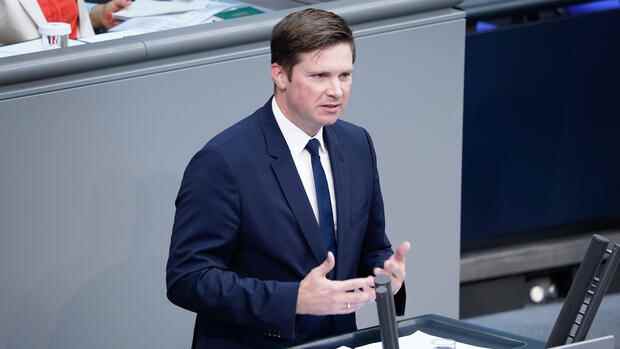Berlin On Tuesday, the Federal Ministry of Finance presented the budget for 2023 in the Bundestag. Parliamentary State Secretary Florian Toncar (FDP), who represented Finance Minister Christian Lindner (FDP), called the draft “a remarkable package”.
According to his own perception, Federal Finance Minister Lindner has achieved a great success with the new budget. The budget relieves citizens in times of high inflation, ensures future investments and still keeps the debt brake for the first time since the outbreak of the corona pandemic.
However, the opposition and the economy see things differently. While the business associations criticize that investments in transport and digitization in particular are neglected, the opposition considers the relief to be a bluff. Mathias Middelberg, deputy chairman of the Union faction, thinks the government is spending the money that it previously took out of the population’s pocket, for example at the gas station: “It’s the left pocket, the right pocket.”
Middelberg also criticized Chancellor Olaf Scholz’s (SPD) claim that the reduction in VAT on gas relieved the population more than the gas levy burdened them. “There is absolutely nothing wrong with this sentence,” says Middelberg, “any idiot can calculate that.” Because the population has to pay at least three times the price, the costs are higher for them.
Top jobs of the day
Find the best jobs now and
be notified by email.
The budget spokesman for the SPD parliamentary group, Dennis Rohde, defended the budget draft. The budget is a sign of a “strong state” that is getting its citizens through this crisis well. “If we didn’t do anything now, it would only become significantly more expensive for the citizens.”
Criticism also flares up in the transport sector
The criticism of the economy also comes from a letter to the budget politicians in the Bundestag, which is available to the Handelsblatt. In it, the Federation of German Industries (BDI) comments on the government’s budget plans. “The federal government has promised future investments for the 2023 budget year, which unfortunately have not materialized again,” it says.
The traffic light coalition had originally planned to reduce spending in the transport sector by a good one billion euros. While spending on roads will remain constant, it should fall on rail, for example. Instead, the federal government wants to increase Deutsche Bahn’s equity.
>> Also read here: The economy is looking for a connection to the rails – but bureaucracy and network problems stand in the way
Inland shipping should also receive significantly less money for infrastructure. The BDI warns that neither rail nor waterways could take over a larger proportion of traffic in order to achieve the climate protection goals. “This is not achievable with the current state of infrastructure.”
The criticism apparently had an effect: the federal government decided at least to increase the transport budget by 1.5 billion euros in its relief package at the weekend. Investments would therefore increase from 18.6 to a good 20 billion euros.
Half a billion euros are earmarked for the rail network, and the planned minus of 360 million euros for the waterways should also be compensated for, the Handelsblatt learned from government circles. The result was “very, very good,” said SPD parliamentary group leader Detlef Müller. The coalition partners are still negotiating the remaining funds. The SPD and the Greens would like to invest the money entirely in the rail infrastructure, “for faster digitization and electrification of the rails and for upgrading the station infrastructure,” as Müller put it. “In order to increase capacity, a focus should be placed on rail freight transport, including the increased promotion of single wagon traffic.”
>> Also read here: railway boss Lutz promises: “It will be better in 2023”
But the industry is unlikely to be satisfied with this. The BDI warns that the previous budget approach alone means “a real decline in view of the increased construction costs”. Likewise, the medium-term financial planning up to 2026 gives “little hope for a trend reversal” in transport spending.
There is no extra money for digital
And even when it comes to digitization, expectations remain unfulfilled. The SPD, Greens and FDP had promised to introduce a “central additional digital budget” when they took over government. “Actually, the digital budget should serve to promote innovations and to be able to experiment,” says the digital policy spokesman for the Greens federal parliamentary group, Maik Außendorf. However, the draft budget for 2023 does not include a separate budget for digitization.
Stefan Schnorr, State Secretary in the Federal Ministry for Digital Affairs and Transport (BMDV), justified the lack of a budget in February with the argument that the federal government’s digital strategy was still in the works.
This strategy is now in place. And yet, according to Handelsblatt information, the ministries are required to finance their digitization projects themselves as far as possible, for example by reallocating funds that have not been called up. A new pot of money in the form of a digital budget would only have led to resentment between the ministries, they say.
>> Also read here: Where the focus of the digital strategy lies and what is still missing
Economy speaks of “lack of ambition”
However, many business associations express concern that the digital strategy cannot be implemented at all without a digital budget. For precisely this reason, the Association of Family Businesses attests that the digital strategy has a “recognizable lack of ambition”.
And so the question of having your own digital budget remains open. On request, the Federal Ministry of Economics informed that the coalition agreement provides for the introduction of a “central digital budget”. Meanwhile, the Digital Ministry promises only one thing: to “support the other ministries to the best of our ability” in the implementation of their own digitization projects.
More: Germany faces another four years of digital standstill
